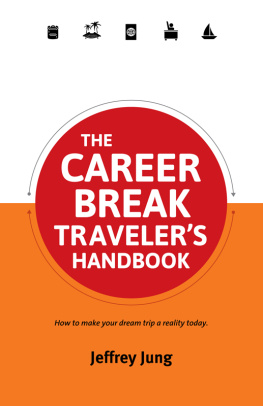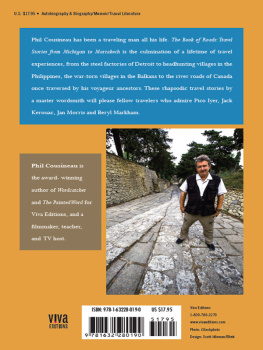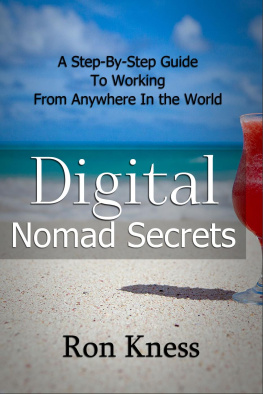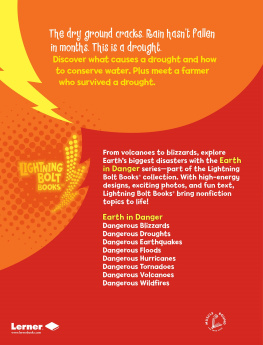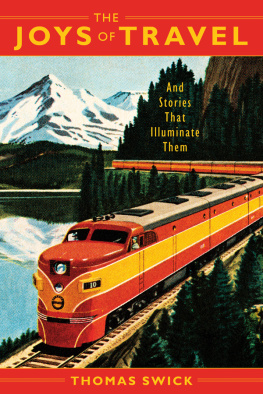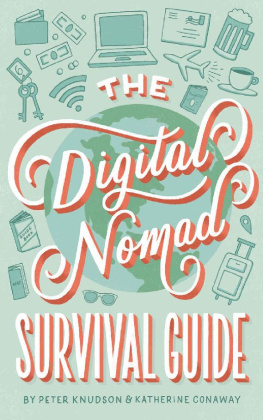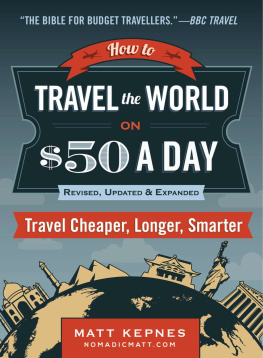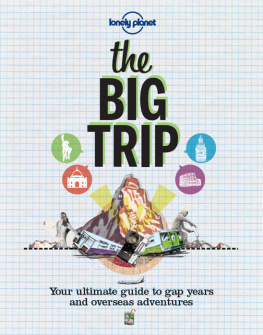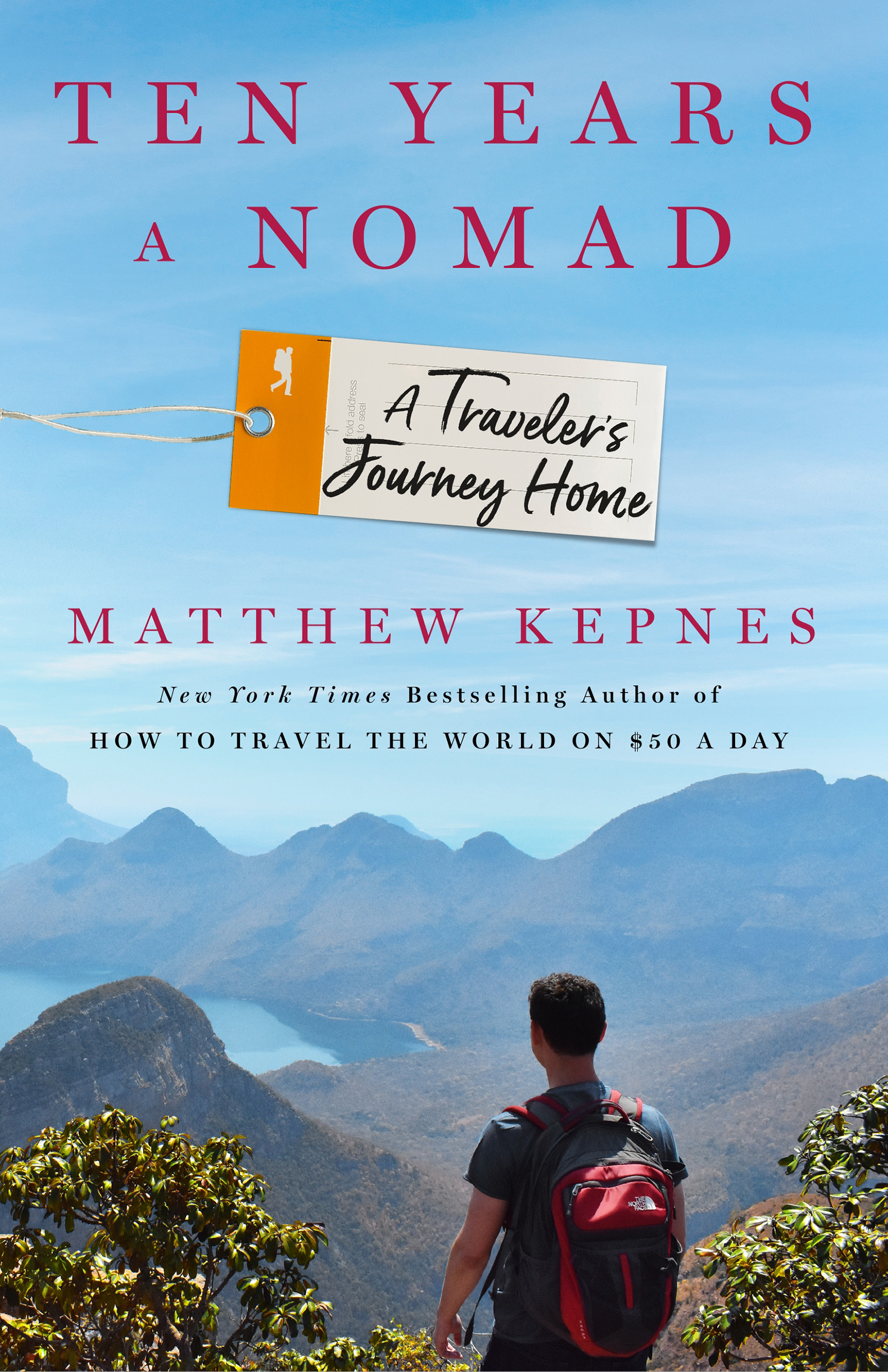The author and publisher have provided this e-book to you for your personal use only. You may not make this e-book publicly available in any way. Copyright infringement is against the law. If you believe the copy of this e-book you are reading infringes on the authors copyright, please notify the publisher at: us.macmillanusa.com/piracy.
ON THAT BUS IN THAILAND.
ON THIS JOURNEY.
EVERY DAY IS A JOURNEY, AND THE JOURNEY ITSELF IS HOME.
Getting the Bug
I havent been everywhere, but its on my list.
SUSAN SONTAG
I AM A NOMAD.
For a decade I have lived a long, peripatetic life on the road.
Three thousand nights.
In more than ninety countries. In a thousand different cities. In hundreds of hostels. With countless people. For half a million miles on airplanes, and half a million more (Ive added it up) on trains and buses and tuk-tuks and cars and bicycles.
That was my home.
In all that time, over all those miles, I wandered with no goal. I wasnt on a trip, vacation, or pilgrimage. I had no list of set destinations or set sights to see. My only purpose was to travel. To be a nomad: Someone who could move from place to place without urgency, without plans. Someone whose destination was the journey itself. Someone who just picked up and went wherever and whenever they pleased.
Traditionally, nomadswhether in the deserts of the Middle East, on the steppes of Eurasia, or on the plains of North Americawere born into an ancient practice of living life in motion. They were my role models, but unlike them, I wasnt born to travel, and had no tradition to draw from.
In my family, we didnt travel. My dad did the hippy thing after college, sleeping in German wheat fields and partying around Europe, but by the time my younger sister and I were born, my fathers long hair had disappeared right along with any wanderlust he or my mom had. Instead, life became defined by the nine-to-five cycle of work.
Like most modern American middle-class families, if we went anywhere it was because we were on vacationleisure travel with a fixed start and end, tied to the calendar of the working year, centered more often than not around visiting relatives. We left home to visit relatives in Philadelphia on holidays or took long road trips to see my grandmother in Florida. Wed visit Disneyworld and Universal Studios; go bowling; and eat early dinners with my grandmother Mimi. Long car rides, nights at big chain hotels, and trips to theme parks were par for the course.
Like figures from a Norman Rockwell painting come to life, we traveled like middle-class Americans were supposed to travel. Predictably. Safely. And never for too long. There would be no backpacking trips, camping excursions, or jaunts to exotic destinations for us. We were not only not nomadic, we were rooted, in place and in custom.
And, as far as I knew, there was no other way to live.
In my mind, travel was a planned break from the rhythm of corporate life, the adult equivalent of being on school break. You worked hard and you treated yourself to an all-inclusive destination a short flight away, or spent your time away from the office in some relatives living room. You took just enough time off that you could muster the strength to go to work every ordinary weekday for decades until it was time for that fabled thing called retirement, when life could truly begin.
Life had a specific path you were supposed to follow: grade school, secondary school, college, work, marriage, retirement.
After you had paid your dues and followed the rules then you were free to do anything you wanted.
I carried that impression of life and travel with me through my teenage years and into my early twenties. When I finished college, I dutifully and happily took my rightful place at the bottom of the middle-class corporate ladder, and took an entry- level job at a hospital in Boston. I answered phones, stocked and ordered supplies, and told visitors which room their sick relative was inI did every job youd expect of someone with no experience.
My life became full of routine.
Commute. Work. Thirty-minute lunch break. Gym with the roommate after work. Take out for dinner. TV before bed. On the weekends, my friends and I would try to meet girls at a bar. Each day blended seamlessly into another.
But this routine gnawed at my soul. I wasnt happy. I grew restless.
I felt as if I was watching my life from the outside, waiting for it to start. Life was supposed to start after college, right? Sure, everyone said that college represented the best years of their lives, but to me, it was always the real world that was supposed to be special.
The real world had things that college lacked: a place of my own; money; a steady relationship; the ability to go where I wanted; to do what I wanted; freedom. It was where I could finally start my life.
Except the real world turned out to be boring as hell.
It was my life, all right, and it turned out to be an endless loop of sameness. When I complained, I was often told that it was normal. How its supposed to be. Dont worry, honey. When you find a job you love, life will be a lot different, my mother would say to me. You just graduated. Youre twenty-three. Dont be so impatient. We all start off at the bottom.
As I approached my one-year anniversary at the hospital, my boss reminded me that I had to take my accrued vacation time soon. Its policy, she said, or youre going to lose it.
I can no longer remember how it happenedtime has taken that precious memory, but I started thinking about Costa Rica. I had come across a tour in one of my many searches online. It wasnt anywhere I had been before, or had even thought much about prior to this, but it was certainly the kind of place my parents wouldnt have gone, which made it immediately attractive.
It looked different. And I wanted different. Anything that wouldnt be filled with dreaded routine. An exotic locale where adventureand maybe some dangerlurked. Online I saw photos of people on a beach, hiking in jungles, and spotting monkeys and exotic birds. They were on ziplines and surfboards. Things I had never done in my life. They were young. They were happy. But, more important than that, they looked far away from where I was, in that work break room, eating my microwaved lunch, fretting about the long commute home through the harsh Boston winter, which only served to remind me that I was stuck firmly at the bottom of the corporate hierarchy.
When I got home that night, I booked a tour to Costa Rica. I thought it was just going to be my first grown-up vacation.
It ended up being my first step toward something more than that.
I DONT PRETEND MY STORY IS UNIQUE. Many, many people can tell a story like minebecause many, many people have found that the endless loop of commuting and ladder-climbing and evenings in front of the TV (or whatever their cultures version of that endless loop is) is not enough to satiate their being. Like me, they left; and, like me, they never came backat least, not for a good, long while; and never the same as when they left.
The story of travel is a timeless tale. My fears and struggles and dreams have been feared and struggled and dreamt many times beforeand, no doubt, will be many times after I am gone.


